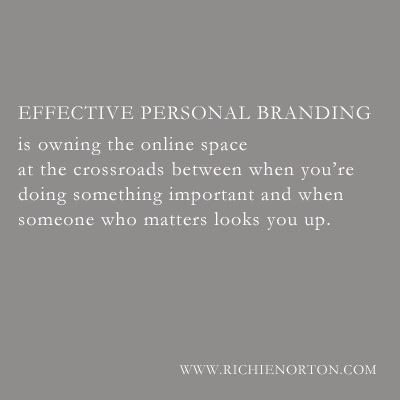Personal Branding: 3 Ways to Develop Your Personal Brand (Part 1)
“If you liked it then you shoulda put your name on it.” – Beyoncé
Oh, wait. Is that not what Beyoncé said? Oh well. That’s what she should have said.
If you like your name, put it online. If not, someone else will control your online identity. Worse, someone might smear it.
If you want to live in hiding and stay away from showing up on Internet search results, well, it’s too late. The Internet has already found you. Over your lifetime, and post-mortem, search results for your name will only increase. Like it or not, a fact of modern man is: you’ve been found!
There are spiders crawling all over the Internet 24 hours a day, searching for your name. Sounds freaky, I know, but it’s not necessarily a bad thing. Depending on how you position yourself, this can be a massive opportunity. These spiders don’t just want to find you, they want to find the real you. They’re searching for the most relevant you. So you can choose, is the most relevant search for your name turning up a wild image that your friend tagged you in on Facebook (worried about your high-school or college days coming back to haunt you)? Or, is the world’s most relevant search result for your name something you have a say in—CONTROL OVER?
WHY YOU NEED TO BE ACTIVELY INVOLVED IN PERSONAL ONLINE BRANDING
The purpose of personal online branding is to help people discover the real you.
THE ONLINE PERSONAL BRANDING TREND
This is a Google Insights chart for the term “personal branding.” Notice the upward trend.
From 2004 (when Google Insights started) to today in 2012, there has been an ever increasing interest in personal branding. Everyday, more and more people are searching on Google for these top key words related to personal branding:
personal brand
personal marketing
blog personal branding
personal branding tips
personal branding statement
what is branding
personal branding online
marca personal (personal branding in Spanish)
branding yourself
LESSONS
Personal branding is becoming more and more important and relevant. Why does that matter to you? Well, as a consumer, who do you trust more? The company with zero online presence, or the company with a verifiable, credible online presence? If you’re anything like the millions (or is it billions??) of people searching for stuff on the internet, you’re going to go with the company that has a strong presence online.
The irony of today’s day and age is that virtual reality (online presence) is what we use to confirm actual reality (physical presence/competence).
You’re in competition with all these people who are branding themselves online. When it comes to your various creative projects, job-finding and gaining trust from a third party, you need good, relevant information about you to pop up in search engines. If not, the people that might otherwise hire you, buy from you, PICK YOU, may end up choosing someone else with a stronger personal brand, because, like it or not, they seem more trustworthy.
Do a little test: Whatever your goal, try googling it. Be it a service you wish to provide, a type of product you want to sell etc. Look over the search results and then ask yourself, “If I was in direct competition with one of these people/entities who is actively building a relevant personal online brand, would I win?”
Three Ways to Develop Your Personal Brand
1. Own the fact that you are a living, breathing brand.
A personal brand isn’t a logo or a color scheme or a fancy font–those things can be an important part of your brand identity, but they’re definitely not the entirety of your personal brand.
SO, WHAT IS A PERSONAL BRAND?
Here’s my definition of a personal brand:
Personal brand = Everything that you are + Everything people believe you to be.
You could be the nicest guy or gal in the world, but if people think you’re a jerk (because of something they came across online or elsewhere)…that’s your brand. If a search for your name pulls up a nasty rant you made on a forum, guess what? You’re not so great anymore to the person trying to learn more about you: you’re a troll. Or at the very least it triggers uncertainty about who you are, so searchers have to dig deeper to try and find the real you. (Most people aren’t willing to do that kind of work.)
You want your online presence to highlight the real, authentic you in congruence with your higher goals and objectives in life.
2. Know that people really are looking for you…when it matters.
People aren’t looking for you everyday. They’re searching for your name when it matters. If you apply for a new job or a new school, they look you up. If you’re starting a new business or promoting a new event, they look you up. If you are speaking at a function or you meet someone at a convention, they look you up. If you’re trying to win over a new client or strategic partner, they look you up. If you move into a new town or someone new moves into your town, they look you up.
Effective personal branding is owning the online space at the crossroads between when you’re doing something important and when someone that matters looks you up.
Plus, your name, your personal brand, will outlast your current employer or station in life. Owning you online can help you bridge the gap between project-to-project, job-to-job. With a little effort, you can create an authentic online personal identity that is sustainable and able to evolve as you evolve.
3. Be the top 10 searches for your name on Google.
This is an interview I did with Chris Bennett the CEO of 97th Floor, an online marketing company focusing on SEO, social media marketing and reputation management about getting your name on the top 10 searches on Google. I’m lucky to say that Chris is a good friend of mine who I’ve known for years. Chris has done projects for companies like Adobe, J.P Morgan, AllState and Mint.com. My favorite memory of Chris is one time , while surfing at Boca Barranca in Costa Rica (where we seriously surfed some of the most amazing waves of our lives) he said, “Every time one of these waves are missed, somewhere in the world a fairy dies.” Likewise, LISTEN to Chris, or somewhere in the world a fairy will die.
Special note: If you share a name with someone famous (or infamous), they may be controlling your online name-space. (Is “name-space” a real term? It is now!) In that case, try associating your name with what they call “local search” in SEO. Try to associate your name with something “local” to you that people would naturally think to search for to find you. You could associate your name online with your business or hobby in order to ensure you rank for that term.
I’ll illustrate: If someone couldn’t find my name right off, they may search “richie norton hawaii” or “richie resumes are dead.” You can be “your name + your town/state/business/hobby/blog/etc.” This would be really important if you were trying to get a specific job or you wanted to rank for a certain term in your industry as a whole. For example, if I wanted to be a professional ballerina in Mississippi, my name better rank for “richie norton ballerina Misissippi” when a tutu fan in Mississippi looks me up.
Stay tuned for Part 2 of this post where I’ll talk about critical questions to consider when using social media like Facebook, Twitter, LinkedIn, Google+, Pinterest and how it relates to personal branding.
What comes up when people search your name?
What are you doing to control/influence your online personal brand?











great explanation about online presence! i am in the process of some re-branding using my name and have learned some valuable lessons about registering your name (not just your company) on social media sites as well as domains.
love your article richie! all this personal seo stuff is like a million times harder when your name is Jon smith. haha
as you can tell from my website name, I took Richies advice a few years back when he told me to do this. I was very hesitant but it is proving to do exactly what he said it would! Great words to live by!
This is fabulous! I love it. I also love having more justification for why i named my blog The Alison show…
What about when you have a first and last name with multiple spellings- lindsay/pearce, will it affect the right people finding you?
Excellent advice!
Interesting article richie. Really liked the upbeat tone and insight. Rupert from ventribe.com
Invaluable post ! For what it’s worth , if your company was looking for a SSA-545-BK , I encountered a sample form here
http://goo.gl/3IAFvRInvaluable piece , Apropos if others are interested in a CitiBank WTRF0710E/S , my business used a blank document here
http://goo.gl/3SwVdf